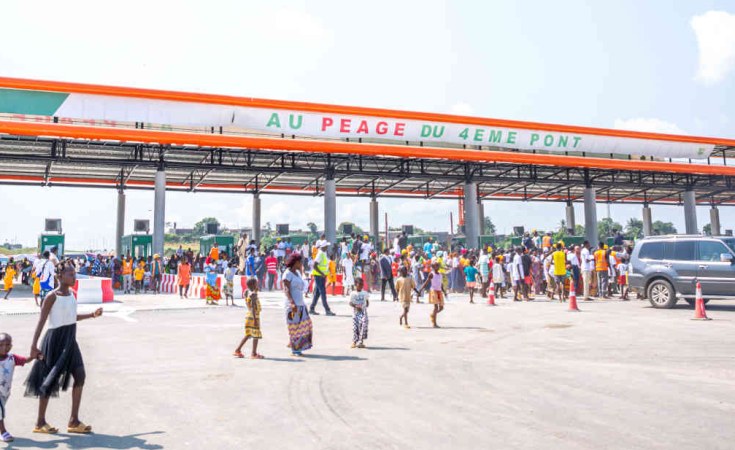Even ahead of its completion, an African Development Bank Group-supported transport project to deepen regional trade and integration in four West African countries is enhancing the wellbeing of local communities through better healthcare access and higher incomes. As a result, travel costs and times for communities in South-eastern Liberia have already fallen steeply.
Since 2014, the Bank Group's African Development Fund has provided $292 million for the paving of 372 kilometres of road network in eastern Guinea, West and South-West Côte d'Ivoire and Liberia's Maryland and River Gee counties.
The Mano River Union Road Development and Transport Facilitation Project builds on an earlier project in Liberia--the Fish Town-Harper Road phase 1 Project--which attracted Bank support.
Much more than a transport initiative, the Mano River Union Road Development and Transport Facilitation project exemplifies the Bank Group's approach of bundling investment in infrastructure, economic and social development to advance broad strategic priorities, including empowering women, deepening trade and integration, and improving health outcomes, said African Development Bank Transport Engineer Prince Tambah.
"The rehabilitated roadway also anchors clinics, markets for goods and schools that are being used by road commuters, boosting the livelihoods of traders, many of them women, as well as improving local communities' access to health care and education," Tambah said.
Along a 16-kilometre stretch of the road that runs from Harper Junction to the Cavalla River in Liberia, the benefits of a paved road surface are already evident. Vehicle traffic has increased, and the workers and small business owners that use the road are thankful for the results: travel costs have fallen by 60% and travel times have been reduced by 70%.
Ms. Caroline K. Morris is an entrepreneur engaged in the trade of goods across the border with Cote d'Ivoire. She lauded the benefits the upgraded road has brought to Maryland County and the South-eastern Liberia. She said, cargo trucks now take less than one hour to reach Pleebo from the Cote d'Ivoire border, down from five days previously. Fares on public transport have also fallen sharply in line with travel times, she said. This has benefited both businesses and consumers that use the road, including by reducing loss of goods, including perishable items owing to the previous length of travel time.
Mr. A Welence Harmon, Commissioner for Duokudi Township agreed. "Paving the road has enabled commuters, including students at Tubman University in Harper, to arrive at their destinations much fresher than before."
Beside the road stands Yookudi Clinic, a part of the project operated by the Ministry of Health. Since it opened in 2019, the clinic has attracted patients--primarily women and children-- from both the Liberian and the Ivorian side of the Cavalla River, "with an average of 10-15 patients coming across from the lvorian side each day," according to Mr. Rawlings Kesselly, Project Coordinator, Ministry of Public Works. The higher number of patients is in part because of the better road surface and faster travel times. Ambulance service to Yookudi clinic has also improved considerably.
Ms. Olivia Blanyon Kamara, Community Health Service Supervisor at the clinic echoed this. Members of the community, notably expectant mothers seeking antenatal care, use the clinic more frequently now, she said. This is because its new location is more amenable than the former one.
The African Development Bank's Tambah anticipates the project's impact will increase. "A crucial element--not yet complete-- is the construction of a 250-metre bridge across the Cavalla River. The Economic Community for West African States (ECOWAS), the regional body, recently began the tendering process to construct the bridge," he said. Construction of the bridge is expected to be complete by end-2025.
For the moment, passage across the river occurs via boat but once the bridge is completed, vehicles will be able to travel between Liberia and Côte d'Ivoire, further easing the cost and ease of transport for traders, including local producers of sugar cane rum as well as other agricultural produce.
According to Tambah, completion of the bridge will breathe life into the market hall that has been built for cross border traders next to the roadway. "And there are plans to train the local women who will sell their wares there in bookkeeping and other business skills," he says.
The impacts of the Bank's work are not going unnoticed. In August 2023, Liberia's president, George Weah, commended the institution's support for the country. He cited the $56 million Fish Town-Harper Road phase 1 Project as emblematic of a strong commitment to Liberia's development.
"The Bank has been a long-time supporter not only of Liberia but of the Mano River Union, an association of four countries-- Cote d'Ivoire, Guinea, Liberia and Sierra Leone--that is seen as a conduit to develop the region's agricultural potential, create jobs for youth unemployment and tackle fragility," said Bank country manager Benedict Kanu.
As of 14 July 2023, total loans and grants amounted to $916.64 million. The current active portfolio in Liberia comprises 16 operations with a total commitment of $378.79 million across various sectors. The transport sector is the largest beneficiary with 60.6% of total commitments, followed by Power (25.2%), agriculture (8.0%), multi-sector (4.8%), Finance (1%), and social (0.4%).


